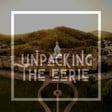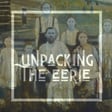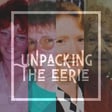Analyzing 'King of the Hill': Bobby and Gaslighting
00:00:04
Speaker
It reminds me a lot.
00:00:05
Speaker
I don't know if either of you watched King of the Hill, but there's a whole part where Bobby is talking to John Redcorn.
00:00:11
Speaker
And it's something to the effect of, are you sure that white people did this?
00:00:15
Speaker
Because I come from white people and this is the first time I'm hearing about it.
00:00:18
Speaker
It's like so much gaslighting.
00:00:22
Speaker
That shit that Bobby said, white proverb.
Podcast Introduction: Unpacking the Eerie
00:00:32
Speaker
And I'm Shaina, and you're listening to Unpacking the Eerie.
00:00:36
Speaker
A podcast that explores the intersections of our dark and morbid curiosities through a social justice lens.
Patreon Support Acknowledgements
00:00:52
Speaker
Hello everybody, this is Shayna, one of the co-hosts for the Unpacking the Eerie podcasts.
00:00:59
Speaker
I'm just chiming in to do this quick intro for this collaborative episode, but before we do that, I wanted to get some Patreon shoutouts in.
00:01:09
Speaker
Thank you so so much to April and Erin for being new patrons, and if you're listening to this, thank you for your patience in getting these shoutouts in.
00:01:20
Speaker
We always want to do the shoutouts on full episodes, and it's been a while since we were able to do that.
00:01:25
Speaker
As we've mentioned before, you know, we have full-time jobs.
00:01:29
Speaker
We do this on the side.
00:01:31
Speaker
We edit and produce our own content, just the two of us.
00:01:36
Speaker
So we really, really appreciate you showing up and supporting our episodes.
00:01:42
Speaker
little passion project so that we can keep it going.
Collaboration with Bex Carlos
00:01:45
Speaker
So back to the episode.
00:01:47
Speaker
This new episode is going to be collaborative like we've mentioned before.
00:01:51
Speaker
We got the pleasure of meeting with Bex Carlos who's the host and creator of Tutti Abruja which you'll learn more about in just a second because I'm going to be inserting a trailer right here.
00:02:13
Speaker
Hi, I'm Bex Carlos, the host of Tutti Abruja.
00:02:17
Speaker
And you're probably wondering, well, what's this show about?
00:02:19
Speaker
I'm your designated Tiabruja.
00:02:21
Speaker
So this is basically a series about witchcraft, the occult.
00:02:25
Speaker
And we also have conversations about how to incorporate the practice into your everyday life.
00:02:31
Speaker
Because the thing is, right, there's so many blocks that we create within ourselves.
00:02:36
Speaker
Like, am I doing this right?
00:02:37
Speaker
Is this the right way to do it?
00:02:39
Speaker
Is this how I follow the rules?
00:02:40
Speaker
But we have to remember...
00:02:44
Speaker
There are rules that we'll learn along the way, but you really just got to learn to trust yourself and your intuition.
00:02:50
Speaker
And this is the space to do it.
00:02:51
Speaker
From the perspective of practitioners of color, be sure and catch us everywhere you listen to podcasts.
00:03:00
Speaker
Can't wait to meet you.
00:03:05
Speaker
Also, big shout-outs to Bex for doing the labor of graciously editing the episode you're about to listen to.
00:03:14
Speaker
Links to Bex's podcast, website, and social media are going to be in our show notes description.
00:03:23
Speaker
So go ahead and check that out, especially if you're a witchy bitch really craving some perspective that, you know, de-centers whiteness in conversations around spirituality.
00:03:35
Speaker
Bex also offers consulting on audio work and podcast editing, so if that's something you're interested in, you can find more information on her website, which like I said will be in the show notes.
00:03:49
Speaker
Well, without further ado, here's our new episode.
Content Warnings
00:03:53
Speaker
It is not a surprise what we are covering considering who our co-host is, but before we get started, we always want to offer a
00:04:03
Speaker
This episode will contain discussions about violence against women, some depictions of graphic violence, and we'll be talking about sexual violence and torture.
00:04:14
Speaker
So as always, please take care of yourselves.
Exploring True Crime and Spirituality
00:04:22
Speaker
One of the things that I love is podcasts.
00:04:23
Speaker
And I think y'all can relate.
00:04:26
Speaker
One of the things that's pretty rad, especially if you're someone who really feels like they live their life at the intersections of social justice and trying to understand why people are the way that they are, you know, sometimes true crime, spirituality, all these different things.
00:04:41
Speaker
It's nice to analyze things from, well, this happened because of X, Y, and Z, and it was a domino effect.
00:04:47
Speaker
And I mean, I think we agreed that we like listening to a lot of true crime and like creepy stuff.
00:04:54
Speaker
But there was a lot of thoughts that we would have while listening to stories or finding out about stories that were just like not touched upon at all.
00:05:03
Speaker
Yeah, there's always a socio-political context that's completely left out of the conversation on violence.
00:05:09
Speaker
And even more paranormal stuff like hauntings, like the haunting stories usually have a tragic backstory that's rooted in some kind of injustice.
00:05:17
Speaker
Paranormal phenomenon is just so whitewashed.
00:05:19
Speaker
Because of that, I think that we all wanted to come together and talk about some stuff that we find interesting.
00:05:24
Speaker
And there have been so many different things going off that are, this is divine timing.
00:05:31
Speaker
I am glad that we're doing this.
00:05:33
Speaker
And I feel like I learned a lot of interesting things while doing research for this episode.
00:05:39
Speaker
Don't get me wrong.
00:05:40
Speaker
I have some issues with Crime Junkie, but I really love the way that Ashley Flowers tells a story.
00:05:46
Speaker
And I remember I was just sort of looking for something different,
Bex's Journey to Collaboration
00:05:49
Speaker
but it sort of brought me to your podcast.
00:05:52
Speaker
And from the get-go, I was like hooked.
00:05:54
Speaker
I had kind of listened to them out of order.
00:05:56
Speaker
So I listened to the one about the Green River Killer.
00:05:59
Speaker
And just the commentary and all of the different things that y'all were new.
00:06:03
Speaker
I'm like, I think it too.
00:06:06
Speaker
I just, I really enjoyed the show and I was like, maybe they'll want to work together for all the listeners at home.
00:06:12
Speaker
I sent them an email just like, let's see what happens.
00:06:14
Speaker
And there were just all of these like divine timing things that kind of made us feel like this was something we were supposed to do.
00:06:22
Speaker
Well, we're so glad that you reached out.
00:06:24
Speaker
We got this email and we were like, what's this?
00:06:28
Speaker
Our first outreach for a collab and I checked out your stuff.
00:06:32
Speaker
And I was like, wow, you know, like this person is really like, well, first of all, I was like, of course, this witchy bitch.
00:06:43
Speaker
And then second, I was like, wow, you know, like this person's covering like spirituality and witchcraft from a lens that's super similar to the approach that we do with unpacking the eerie.
00:06:53
Speaker
It's like a similar framework with different topics.
00:06:56
Speaker
And it felt super complimentary.
00:06:58
Speaker
And I love your guests.
00:07:00
Speaker
I've tried to keep it very diverse, because I feel like sometimes in various, you know, podcasts about occult, metaphysical, or just like witchcraft, it's always focused on people that just have these very large audiences.
00:07:13
Speaker
And I think that that's important.
00:07:14
Speaker
And I think that we should, you know, look to all different types of people, though, because it's like, we're all magic, and all of us carry all these traditions and
00:07:23
Speaker
The fact that we're here and that so many of our ancestors have, you know, dealt with so much trauma and genocide and violence.
00:07:30
Speaker
And so many of us have the traditions that we're able to continue on.
00:07:33
Speaker
That's a blessing in itself.
00:07:36
Speaker
You know, it's really, I think, powerful to help people connect with various things related to their traditions that are not focused on, I guess.
00:07:43
Speaker
And so, yeah, that's that's the kind of work that I do.
00:07:46
Speaker
And so, yeah, I am that witchy bitch.
00:07:50
Speaker
We identify as such.
Significance of the Number 314
00:07:54
Speaker
Oh, and I want to bring up the fact because like I mentioned this all the time on the show.
00:07:59
Speaker
Louis area and the area code here is 314.
00:08:02
Speaker
So I have been noticing since I was about 21 and I'm 27 now that every now and then I'll see the 314 number, but it'll be like something that keeps showing up in terms of like it was someone I knew's apartment number when I was 21 and it was the code to get into their building.
00:08:22
Speaker
So it was something that I saw very frequently.
00:08:24
Speaker
And then it was also Shana's apartment number at one point of time.
00:08:31
Speaker
And like, I see it kind of out in the world too.
00:08:34
Speaker
And one thing that made me be like, oh, we for sure have to like follow through on this person reaching out to us is because your area code is 314.
00:08:46
Speaker
And I saw it in the phone number in your signature.
00:08:49
Speaker
So that's also funny, because you had mentioned that precast.
00:08:52
Speaker
And I also at one point lived in an apartment that was 314, which was like on the screen of where all this really creepy stuff in regards to events that inspired The Exorcist happened.
00:09:05
Speaker
I'll have to send y'all the link to that specific.
00:09:09
Speaker
But yeah, so I lived on that street, which was a very like strange time in my life.
00:09:13
Speaker
And that was a really creepy building.
00:09:15
Speaker
I feel like 314 is that number that's associated with a lot of collaborations and magic related things.
Bex and Shaina: Childhood Experiences of 'The Exorcist'
00:09:22
Speaker
Well, it's interesting that you say that about The Exorcist, because Shana and I briefly talked about it last night, because I watched The Exorcist when I was really young, probably like 10 or 11, and I couldn't get through the whole thing because it like freaked me out too much.
00:09:36
Speaker
And I like had a fever.
00:09:38
Speaker
from watching it and then shayna shared that i used to watch it to go to sleep as a kid what comfort movie yeah you know some people watch animated shows yeah and i put on horror movies to go not even horror movies but like the exorcist that's true the exorcist it wasn't the only one there was also the shining in rotation but yeah psychoanalyze that audience
00:10:07
Speaker
I actually have an episode where I talk about how I watched The Exorcist really young too, around like eight or nine.
00:10:12
Speaker
And so I think that because of that, that particular case is just something that's always been very terrifying to me.
00:10:20
Speaker
And the fact that like the events that inspired that happened in my hometown, you know, there's just a lot of layers.
00:10:27
Speaker
Yeah, that's creepy.
00:10:29
Speaker
It's kind of similar to how my life is weirdly parallel with Ted Bundy's.
00:10:35
Speaker
Because I had my internship at the same place that he apparently had an internship.
00:10:40
Speaker
And then I lived like two blocks from where his girlfriend used to live in Seattle.
00:10:46
Speaker
And then there was like something else.
00:10:47
Speaker
But it's like, why?
00:10:49
Speaker
Why am I so tied to this man?
00:10:52
Speaker
man also not too far from there the monkey pub used to be his watering hole oh ew yeah i think it's up rosafell i'm not sure but it's like in between where you and i were yeah yeah walked you would we would walk right yeah yeah in my old apartment we lived right next to a super nice park it's called ravenna park it's in northeast seattle
00:11:14
Speaker
beautiful green park.
00:11:15
Speaker
Okay, it's creepy.
00:11:16
Speaker
But I'm sure that he spent a lot of time in there because it's very creepy at night and there's no lights at all and it's covered with trees.
00:11:25
Speaker
So I'm sure he used it.
00:11:28
Speaker
I'm sure he used it.
00:11:29
Speaker
Yeah, I don't know.
00:11:30
Speaker
I never vibed with the park and then I learned that Ted Bundy probably chilled there.
00:11:35
Speaker
I was like, oh, I really don't like the park.
00:11:37
Speaker
And the ox should be like, you want to go on a walk to Ravana Park?
00:11:39
Speaker
I'm like, no, bitch, I don't.
00:11:41
Speaker
I would go there in the daytime.
00:11:42
Speaker
Because there's usually a lot of people.
00:11:45
Speaker
That gives the same energy as like when you don't like somebody, but you don't have a reason.
00:11:50
Speaker
And then you find out that reason.
00:11:54
Speaker
There's always a reason.
00:11:55
Speaker
There's always a reason.
00:11:56
Speaker
And now I just trust it because I have not trusted it a lot of times and regretted
From Fear to Fascination: Serial Killers and Witchcraft
00:12:04
Speaker
You know, it's funny because like ever since I was a little kid, I was just always so interested in scary movies and serial killers.
00:12:13
Speaker
I think I blame Unsolved Mysteries for that one.
00:12:15
Speaker
And then just witchcraft, you know, and I was always so scared of those things.
00:12:20
Speaker
There's that whole thing where it's like the things that scare you sometimes are the ones that you like the most.
00:12:24
Speaker
And I definitely felt like that, you know.
00:12:27
Speaker
Salem was always one particularly that I had so much interest in.
00:12:31
Speaker
I went to Salem once.
00:12:32
Speaker
It's kind of a commodified place.
00:12:35
Speaker
Yeah, that makes sense to me.
00:12:36
Speaker
Yeah, it felt very touristy.
00:12:38
Speaker
But, you know, all the old structures are there and the places where a lot of bad shit happened, like the trials and then like the people who were responsible for putting the trials on, like where they lived, have been turned into pubs and stuff, which is kind of creepy.
00:12:52
Speaker
But I didn't go on the real tour because it costs a lot of money.
00:12:55
Speaker
And I was like, you know, it's going to self-tour.
00:12:57
Speaker
Self tours are great.
00:12:58
Speaker
Us talking about Salem transitions.
00:13:01
Speaker
It does transition very well.
Salem Witch Trials: Historical Context
00:13:03
Speaker
Today, we're talking about witch hunts.
00:13:06
Speaker
And we wanted to give a broader context to what that looks like across the globe and over time.
00:13:13
Speaker
And really the only witch hunt that gets talked about over and over are based in the West, specifically the Salem Witch Trials gets so much attention.
00:13:23
Speaker
And it really didn't last that long.
00:13:25
Speaker
really wasn't as many people as other places.
00:13:27
Speaker
Not that that minimizes what happened to them.
00:13:30
Speaker
It just says a lot about who we care about.
00:13:33
Speaker
For folks who don't know what the Salem witch trials are, or, you know, I've heard of it and don't have like the information.
00:13:39
Speaker
The Salem witch trials began during the spring of 1692 after a group of young girls in Salem village, Massachusetts claimed to be possessed by the devil and accused several local women, witchcraft,
00:13:53
Speaker
So like this big wave of hysteria spreads through colonial Massachusetts and a special court convened to address this in Salem to hear the cases.
00:14:02
Speaker
And this continued for about a year.
00:14:04
Speaker
So during this time, there was like a recent smallpox epidemic and there were fears of attacks from neighboring indigenous tribes and longstanding rivalry was forming between the more affluent community of Salem and the
00:14:19
Speaker
less affluent communities so there's this like class differential as well so of course it's like easy to scapegoat women especially poor houseless or enslaved women those were all the women that were targeted for witchcraft most people know about salem through arthur miller's play the crucible i also read it in school did you yeah i did in singapore yes what the fuck we did it in my drama class and then we like did role play stuff
Ergot Theory of Salem Symptoms
00:14:44
Speaker
What they didn't tell me in school was that actually the crucible is written as an allegory for like the anti-communist witch hunts that were perpetrated by Joseph McCarthy in the 1950s.
00:14:55
Speaker
It was a political commentary and it was like not just a recounting of this story.
00:15:02
Speaker
In an effort to like try to explain why the people who were vomiting and convulsing and had quote unquote delusions, there was a 1976 book.
00:15:13
Speaker
scientific investigation posted in science magazine and they cited fungus ergot which is found in rye wheat and other cereal which toxicologists say can cause those symptoms so wow that was explained long time after which also honestly speaks to how much we hold on to stories about people in the west
00:15:39
Speaker
Someone really put the time in to investigate that shit so long after.
00:15:44
Speaker
I mean, same with Titanic, right?
00:15:45
Speaker
Same with Titanic!
00:15:48
Speaker
They put a plaque at the bottom of the ocean!
00:15:50
Speaker
You can still go spend thousands of dollars to dive down there.
00:15:54
Speaker
But the actual hell!
00:15:55
Speaker
There were fucking genocides that don't get that recognition.
00:16:01
Speaker
That's the Salem witch trials in a very small container.
00:16:05
Speaker
And on that note, I was talking about how we want to shed light on more international stories.
00:16:11
Speaker
And also, we look at witch hunts as something that's very much time capsuled in the past.
00:16:18
Speaker
But in reality, it's been happening continuously up until modern times, which is something that Akshi is going to
Chutni Mahatho: Survivor's Story
00:16:24
Speaker
You know, just a content warning, like a lot of the stuff I'm going to be saying is super, super intense violence against women, like graphic violence against women.
00:16:37
Speaker
So just putting that out there.
00:16:40
Speaker
I'm going to start by quoting a survivor of witch hunts in India.
00:16:47
Speaker
This is a story of Chutni Mahatho or Chutni Devi.
00:16:52
Speaker
I want to quote her saying her story.
00:16:55
Speaker
She says, I was married into a joint family in Jamesh the poor in 1978.
00:17:01
Speaker
I wanted the children in the family to study, which went against the elders interests.
00:17:06
Speaker
And that was the beginning of my bad days.
00:17:09
Speaker
When one of my neighbor's daughters got sick, people started suspecting me of practicing witchcraft and called the panchayat, which is the village council, where I was suspected as a witch in September 1995.
00:17:21
Speaker
Some people from my in-law's side, along with villagers, barged into my house and tried to rape me.
00:17:28
Speaker
A panchayat was called again, but no action was taken.
00:17:32
Speaker
Following that, she was tortured for three days.
00:17:36
Speaker
And the panchayat also imposed a fine of 500 rupees on her for practicing witchcraft.
00:17:43
Speaker
And she was forced to pay, but it still didn't stop.
00:17:46
Speaker
One night, the villagers called an exorcist who wanted to force me to consume human feces and urine to get rid of my
00:17:54
Speaker
They couldn't succeed.
00:17:55
Speaker
So she was publicly humiliated by her in-laws and branded a witch in her community.
00:18:02
Speaker
And after all of the stuff that I just described, including at one point, she was tied down and beaten up.
00:18:09
Speaker
And she also was forced to walk through the streets of her village.
00:18:15
Speaker
After all of that happened, they then dragged her and her three children out of their house and ostracized her from the community.
00:18:23
Speaker
And so she became homeless.
00:18:24
Speaker
She said, no one came forward to help.
00:18:27
Speaker
I was forced to spend nights under a tree.
00:18:29
Speaker
I walked miles along with my children to reach my parents' place, who then took me to the Gamharia police station where the police refused to register my complaint.
00:18:40
Speaker
And this was in 1995.
00:18:42
Speaker
So pretty recently in India, around 2,500 people have been accused of witchcraft and have been killed between 2000 and 2016, according to crime records.
00:18:55
Speaker
And these are just reported cases to the police.
00:18:58
Speaker
And a lot of cases go unreported.
00:19:00
Speaker
Partners for Law and Development state it is only the most gruesome cases that are reported.
00:19:05
Speaker
Most cases of witch hunting go unreported and unrecorded.
00:19:09
Speaker
which makes sense when the police oftentimes will not even take a report for it.
00:19:14
Speaker
Often how this tends to happen is that the perpetrators of the branding will consult with a witch doctor who are sometimes known as Konces, Sokka, Janguru, or Oha.
00:19:27
Speaker
The people in villages who use medicinal herbs and that people go to for consulting about a variety of things.
00:19:34
Speaker
Supposedly, this witch doctor, who's usually a male,
00:19:37
Speaker
will use incantations and then writes the name of all the suspected on a tree.
00:19:44
Speaker
And the name that's on the branch that withers is condemned a witch.
00:19:48
Speaker
There's also other ways that this like supposed witch doctor does that, which is that he'll write the names of people on rice and,
00:19:56
Speaker
and put them in different bags in a nest of white ants and whichever bags that ants eat is the witch.
00:20:04
Speaker
Sometimes they also use potions.
00:20:07
Speaker
So in 2011, a shaman forced 30 women to drink a potion to prove they weren't witches and it had a poisonous herb in it and they all fell ill and the shaman was arrested.
00:20:18
Speaker
Oftentimes, these are not actually like real rituals.
00:20:22
Speaker
Shamans and witch doctors are paid money by the perpetrators in order to label specific women as witches.
00:20:32
Speaker
Once they've been identified properly,
00:20:34
Speaker
Branded, publicly accused women will experience a variety of atrocities like content warning again.
00:20:42
Speaker
Being forced to have their heads shaved.
00:20:44
Speaker
Walking through their villages naked.
00:20:46
Speaker
Sometimes while being chased by a mob.
00:20:50
Speaker
Having parts of their body cut off.
00:20:52
Speaker
Especially sexual parts of their body cut off.
00:20:56
Speaker
Having their teeth broken.
00:20:58
Speaker
Being forced to consume...
00:21:00
Speaker
urine and feces, eat human flesh, sometimes drink the blood of animals, sometimes pierced iron rods that mobs sometimes chase them with.
00:21:10
Speaker
They have been pierced through their body and oftentimes people bleed to death.
00:21:15
Speaker
And they have also experienced lynching and being burned alive.
00:21:20
Speaker
That's kind of the spectrum.
00:21:22
Speaker
At best, they're ostracized from their village and at worst, they experience all of these other things too.
00:21:29
Speaker
So the communities that this occurs in is typically in more rural areas of India.
00:21:36
Speaker
Women are the most vulnerable to experiencing this, but it's not just specifically women.
00:21:41
Speaker
It's poorer women of lower castes who are typically older women, widows, or single women.
Caste and Gender Intersections in India
00:21:48
Speaker
There's clearly a pattern there of women who aren't attached to a man at a point in their life.
00:21:55
Speaker
I actually found a really great quote by Pooja Singhal Purvar, who is a social welfare official in India.
00:22:03
Speaker
And she says that the superstition is a mask for true motives and that it's only an excuse.
00:22:08
Speaker
And they spread superstitions like in a way to control women and like use it as an excuse to commit.
00:22:16
Speaker
atrocious acts of violence.
00:22:18
Speaker
Terrence McCoy from the Washington Post states, by punishing those who are seen as vile and wild, oppressors perhaps want to send not so subtle message to women.
00:22:27
Speaker
Docility and domesticity get rewarded.
00:22:30
Speaker
Anything else gets punished.
00:22:32
Speaker
So now I'm going to kind of go into the reasons why this specifically happens in India and why it happens to this very specific population as well.
00:22:42
Speaker
And you'll notice that all of the reasons actually intersect with each other very well to form a conclusion of this happens in India.
00:22:50
Speaker
as a way to violently sustain caste or Brahmanical patriarchy in India, which is related to the caste system.
00:22:59
Speaker
So it's an intersection of both caste and gender.
00:23:02
Speaker
And because most of the victims of witch hunts in India today come from scheduled oppressed castes,
00:23:10
Speaker
Dalit activist P.G.
00:23:12
Speaker
Mbaithgar in 2017 claimed that there isn't a single case of witch hunting against upper caste or Brahmin women that has been identified to this day.
00:23:22
Speaker
So it's like a very clear and obvious population that is being targeted with this like atrocious violence.
00:23:29
Speaker
So just a little bit about the caste system to give some people context who wouldn't.
00:23:34
Speaker
It is a system that some people will say is a legacy to Indian society, but it definitely still exists today.
00:23:43
Speaker
And it was given by Brahmanism.
00:23:45
Speaker
It's a sociopolitical ideology in which Brahmins occupy the highest place.
00:23:51
Speaker
And they're like seen as the sole providers of wisdom and knowledge on practically like every issue of the world.
00:24:00
Speaker
It is considered to be the main factor, like Brahmanical patriarchy, behind witch hunting or branding of women as witches.
00:24:09
Speaker
Dalit activists claim that witch hunting is part of the many caste atrocities against Dalit women and a common way and excuse used to kill them, literally.
00:24:20
Speaker
Dalit women stand at a very marginalized intersectional identity.
00:24:25
Speaker
They're part of the most vulnerable caste in India.
00:24:28
Speaker
So they face discrimination based on their caste, but they also face discrimination based on their class and gender, both from within their caste and from outside of it.
00:24:39
Speaker
So because of that, they face a lot of violence, including as this phenomenon of witch hunting.
00:24:45
Speaker
Tanvi Yadav, who was a research caller in the Department of Public Policy, Law and Governance in Central University of Rajasthan, wrote a paper that's called Witch Hunting, a Form of Violence Against Dalit Women in India.
00:25:00
Speaker
And in that, she says, grabbing property, political jealousy, personal conflicts, getting sexual benefits, or settling old scores are found to be common reasons to declare a woman unrighteous.
00:25:14
Speaker
However, deep down, it is a conspiracy of Brahminical patriarchy to control resources and sustain caste hierarchy by hitting where it hurts the most, inflicting injuries on Dalit women.
00:25:28
Speaker
There was a story about how this Daleth woman was branded as a witch by upper caste people in her community that didn't approve of her mother-in-law being elected the head of the village committee and the development work that her mother-in-law wanted to do.
00:25:44
Speaker
This victim told reporters that they had victimized her solely because she belonged to the Dalit community and that the upper caste men in the community had made some unreasonable demands from her mother-in-law.
00:25:58
Speaker
And when she refused to fulfill those
Witch Hunts as Gender Policing in India
00:26:01
Speaker
desires, they started torturing the victim, who's her daughter-in-law, after branding her a witch.
00:26:07
Speaker
And then the whole upper caste community socially ostracized their whole family.
00:26:12
Speaker
So that's a story.
00:26:13
Speaker
And then another story is how one Dalit woman was blamed for a child's death in a landlord family and accused as a witch because this child was
00:26:24
Speaker
died other women in her village stood in her support and so the village authority dis like disliked this and took this as an opportunity to kind of like teach these women a lesson so all four women were branded as witches by the witch doctor who was paid money by the perpetrators to do this and he then forced them to drink a potion and use that as an excuse to brand them as witches
00:26:53
Speaker
Often what happens is that whoever is named the witch is chosen by powerful groups and their followers, usually in an upper caste.
00:27:02
Speaker
And they usually identify these witches in communities that have a lot of Dulles women in them.
00:27:10
Speaker
Dunvey also states that one of the most common explanations for witch hunting is gender-based violence in which vulnerable women are targeted by men in power.
00:27:21
Speaker
And witch hunting has resulted because of the successful enforcement of patriarchal order that forces women violently into a position below men and just like objectifies them so much to the point where, yeah, they have no autonomy, freedom.
00:27:39
Speaker
of their life or body.
00:27:41
Speaker
Doing research on it, I was like, oh my god, what the fuck?
00:27:46
Speaker
And I started crying.
00:27:47
Speaker
I was mentioning this to Shaina the other day, like the way that men in India are just like,
00:27:55
Speaker
so violently oppressive towards women in such a like blatant way like I'm just thinking about a really famous case where in Delhi this girl who was like in her 20s like literally went out for a movie with her male friend and was going home around 8 p.m.
00:28:14
Speaker
and this group of men
00:28:16
Speaker
Saw them together and was like, oh, you shouldn't be out of the house with a man who isn't your father, brother, or husband.
00:28:26
Speaker
And they killed her friend and then gang raped her.
00:28:29
Speaker
And it was a really famous story.
00:28:31
Speaker
And it was pretty much they were just policing her for being outside of the house after a certain point of time without like a male escort.
00:28:38
Speaker
Shit like this happens in India all the time.
00:28:41
Speaker
It's like a spectrum of violence.
00:28:44
Speaker
And it's just something that women honestly are taught to expect in their lives.
00:28:49
Speaker
That's really terrifying to me to just think about people's capacity for violence, especially male violence.
00:28:57
Speaker
It is literally so terrifying.
00:29:00
Speaker
And to feel no more remorse after her and instead, I don't know.
00:29:04
Speaker
You're like justified.
00:29:09
Speaker
As if it's tied to like your worth as a man.
00:29:13
Speaker
Clearly, it's like really obvious that this phenomenon, I guess, is the right word for it?
00:29:19
Speaker
is like very much about policing women and enforcing gender norms, because most survivors are able to draw a very clear connection between their experience and, you know, it being based in gender based violence.
00:29:33
Speaker
A lot of women recall that they were branded as witches, not because they caused any harm to anyone else, but because they broke gender norms by either
00:29:42
Speaker
refusing a sexual advance from a man or by inheriting land.
00:29:46
Speaker
So that's really interesting.
00:29:48
Speaker
This land possession reason is also very common reason why this witch hunting happens.
00:29:55
Speaker
And basically like fields, homes, lands, livestock are all resources that can be stolen through witch hunting because many victims are childless widows who have property rights.
00:30:06
Speaker
When they die, their property is passed on to the nearest male relative in their family.
00:30:11
Speaker
And these male relatives, by accusing them of witchcraft, are able to get the land.
00:30:15
Speaker
Literally, in some areas, women are targeted and victimized through witch hunting by land mafias.
00:30:23
Speaker
In the dominant caste in order to steal their land and settle their interest in this land behind this mask of superstition.
00:30:31
Speaker
Because they're able to declare them a witch, force them out of their home, get them ostracized from their village, and then it's super easy to get their property.
00:30:40
Speaker
And in some areas, there's like a rule that a widow's right to property is denied if other members of her family can prove that she's a witch.
00:30:49
Speaker
How do you prove someone's a witch?
00:30:50
Speaker
You ask the witch doctor who you paid money?
00:30:54
Speaker
Three Gujarati women were accused of eating the souls of their male relatives, were then beaten nearly to death and forced to give up their land and made to live with their abusers.
00:31:05
Speaker
I really hate it here.
00:31:06
Speaker
And I hope their souls get eaten.
00:31:09
Speaker
Currently, there's no national law in India or even state laws that address this issue or ban witch hunting.
00:31:18
Speaker
However, there is some local legislation in areas where it's prevalent.
00:31:23
Speaker
Some states have tried to outlaw witch hunts, but it hasn't really helped either because dozens of murders related to witch hunting happen every year in a lot of areas in India.
00:31:34
Speaker
That's all I have.
00:31:35
Speaker
It truly is a way of putting women in their place because in Salem, that was one of the biggest reasons was a property grab, which I feel like is not discussed enough.
Global Themes of Oppression
00:31:44
Speaker
It's just so interesting because like this is happening in like rural India where they have most likely never heard of Salem witch trials.
00:31:54
Speaker
So like that's not where they're like getting this idea from.
00:31:57
Speaker
And it's just happening in two completely different places in the world.
00:32:01
Speaker
But for exactly the same reason.
00:32:03
Speaker
Yeah, I mean, I guess this is a half-baked thought, but I'm just thinking about how, like, more Native spiritual practices that have existed in all of those places, you know, forever...
00:32:14
Speaker
I think over time, post-colonialism, because it had been weaponized before, they understand that it can be weaponized to enforce their own supremacy, you know, like target groups, in this case, women.
00:32:27
Speaker
But in other cases, like dictated by race, class.
00:32:31
Speaker
I mean, here also, caste, class.
00:32:36
Speaker
Yeah, it's just all rooted in upholding the finger quote norm.
00:32:43
Speaker
I feel like everything stems from capitalism and colonialism.
00:32:47
Speaker
Sense of almost like convenience at times, right?
00:32:49
Speaker
It's easier to accuse
Witchcraft and Colonization in Mexico
00:32:52
Speaker
someone of something terrible and potentially profit or benefit from that in some sort of way than it is to figure out the ways or methods to find or get something yourself.
00:33:05
Speaker
Which sort of, I guess, brings me to my topic.
00:33:07
Speaker
Okay, so my topic, because it definitely ties in with witchcraft in the sense that I think that there's the understanding that witchcraft is always connected with, like, the devil.
00:33:19
Speaker
A while back on my show, we recorded an episode of the history of Tequila the Spirit in regards to...
00:33:29
Speaker
There being folklore of one of the most prominent families to be in Ticula had sold their soul to the devil to achieve the success that they did.
00:33:39
Speaker
And so that kind of got me into a place thinking about magic, thinking about the devil, thinking about colonization, just all these various things, right?
00:33:48
Speaker
because in that episode, we had talked about how, and I'm going to link the episode in the show notes so you can listen, but we had talked about how their grandfather built a house that my grandmother lived in for a while.
00:34:02
Speaker
So I spent time in this house and it was definitely haunted.
00:34:06
Speaker
And recently I was talking to my mom about it.
00:34:08
Speaker
I had mentioned to her that they had had someone in their inner circle die in the house, to which I said, oh, that's probably why it's haunted.
00:34:14
Speaker
And my mom said to me, well, that's one possibility.
00:34:18
Speaker
The other possibility is that when the Spanish were colonizing that region, they would dump bodies there.
00:34:28
Speaker
And so I started to dig a little bit more into just the history of colonization in Mexico specifically.
00:34:36
Speaker
So let me set the stage for you because I did not know this.
00:34:39
Speaker
And to be quite honest, the monarch in Spain is a little confusing to me.
00:34:43
Speaker
So I'm going to kind of break it down and get it up to the point of witch hunts.
00:34:47
Speaker
So Isabella and Ferdinand married in 1469, which respectively unified their kingdoms.
Spanish Inquisition and New World Silver
00:34:55
Speaker
They were known as the Catholic Monarchs.
00:34:58
Speaker
And in 1478, the Spanish Inquisition began as a dual effort to stomp out any faith that was not Catholicism, primarily eliminating any Jewish people and
00:35:11
Speaker
in any of the land that was Spain or their territories and or any other kingdoms that they ruled, which they did have a lot of Europe at the time.
00:35:20
Speaker
And that later changes to expand on to more.
00:35:22
Speaker
So it was a dual effort on their parts.
00:35:25
Speaker
And in 1492, Columbus is sent to the finger quote, new world in 1504, Isabella dies, leaving Joanne, her daughter to take her place as queen.
00:35:36
Speaker
So soon after that, they start to see an influx of silver from the new world.
00:35:42
Speaker
So it sort of starts to make them feel like they made the right decision going there.
00:35:47
Speaker
So Philip was Joanne's husband who was supposed to take the throne.
00:35:53
Speaker
At that point, Isabella had died.
00:35:55
Speaker
So it would be him and Joanne.
00:35:59
Speaker
However, Ferdinand just really enjoyed being king.
00:36:03
Speaker
So he had signed all this legislation and then essentially tried to figure out a way to get out of it.
00:36:08
Speaker
Well, he is lucky, I guess, is a way of putting it, because in 1406, Philip actually dies.
00:36:15
Speaker
So Ferdinand is allowed to continue his reign.
00:36:18
Speaker
And Ferdinand dies in 1516.
00:36:19
Speaker
So Charles' son...
00:36:23
Speaker
who was raised in Belgium, comes to Spain and being hungry for the throne, locks up his mother in a convent for being mentally ill.
00:36:33
Speaker
So thus becomes his reign in Spain.
00:36:36
Speaker
The reign in Spain.
00:36:37
Speaker
So his official rule starts in 1519.
00:36:40
Speaker
King Charles I, he bribes some prominent German officials to be given the title of the Holy Roman Emperor.
00:36:49
Speaker
And at this point, he has vast power over Europe.
00:36:52
Speaker
The empire has extended to other places besides just Spain.
00:36:56
Speaker
But overall, his rule is...
00:36:59
Speaker
deemed as a failure.
00:37:01
Speaker
There were a lot of things going on.
00:37:03
Speaker
You had Martin Luther begin the Protestant Reformation.
00:37:07
Speaker
So that's something that he's dealing with as they've acquired Germany.
00:37:10
Speaker
That is not good vibes.
00:37:12
Speaker
At this time, also...
00:37:14
Speaker
Hernán Cortes has made his arrival in the area that is now Mexico City.
00:37:21
Speaker
And what was really interesting to me is that I had never expanded upon the areas of New Spain and how they were specifically chosen.
00:37:29
Speaker
So this is interesting and heavy.
00:37:32
Speaker
So a big reason amongst all the other things that they were finding is they were trying to essentially find a replacement for brandy because the supplies to make brandy
00:37:41
Speaker
had been running out.
00:37:43
Speaker
And so they needed something else that could potentially fill that place to be able to get drunk.
00:37:49
Speaker
And when they encountered the Aztecs, they used agave nectar and different parts of the agave.
00:37:57
Speaker
Like, for example, one thing that I remember reading was a cure in Aztec culture for like an injury was if you mixed egg whites and agave nectar and put it over something, it would help disinfect it and remove any bacteria.
00:38:11
Speaker
That led for them to find more agave, a place where they could find a lot of agave.
00:38:17
Speaker
What's interesting about this is in order to make tequila, you can only get it from a few specific states and regions in Mexico.
00:38:25
Speaker
The state of Jalisco being one of them, which is where my family is from.
00:38:32
Speaker
And the general area that is Guadalajara was the second city in Mexico to be part of what is, finger quote, New Spain.
00:38:40
Speaker
So this is still under the rule of Charles.
00:38:43
Speaker
In 1529, Nuno Beltran de Guzman arrives in the area of Jalisco.
00:38:51
Speaker
This area was primarily made up of the Huichol Cora Coca.
00:38:56
Speaker
It wasn't necessarily located in the area in which Tequila is now, which makes me kind of circling back to the fact that my mom's statement in regards to where bodies were dumped.
00:39:07
Speaker
At first, there wasn't a whole lot of resistance to the Spanish.
00:39:11
Speaker
I think that this was primarily due to the fact that Guzman had come to the area with 300 Spaniards.
00:39:19
Speaker
and 6,000 indigenous warriors.
00:39:21
Speaker
And so there wasn't a whole lot of resistance.
00:39:24
Speaker
And so the village of Santiago Tequila was found.
00:39:28
Speaker
Under this rule as well, in 1541, various indigenous groups rebelled against the Spanish, including, and I do apologize if I'm mispronouncing these, the Texconines, the Caxocanes, from the neighboring towns of Tatlanago, Xochipitila, Nochetetlan, and
00:39:48
Speaker
Teoclatec rebelled first with those and Tequila joining later.
00:39:52
Speaker
This was called the Mixtón Rebellion.
00:39:55
Speaker
And this continued on until in early 1542, the stronghold of the Mixtón fell to the Spaniards and the rebellion was over.
00:40:03
Speaker
The aftermath of the natives' defeat was that thousands were dragged off in chains to mines and many of the survivors, mostly women and children, were transported from their homes to work on Spanish farms and haciendas.
00:40:17
Speaker
Guadalajara was soon after founded in its current state.
00:40:21
Speaker
But I just find that really fascinating that Guadalajara was founded second to tequila.
00:40:27
Speaker
But I think, again, that had to do with the fact that they were searching for something to help get people drunk.
00:40:33
Speaker
And you might be asking yourself, well, why is this all relevant?
00:40:36
Speaker
So this is relevant because when I started doing research for my witch hunt, picking the Mexican Inquisition, which again is an extension of the
00:40:46
Speaker
Spanish Inquisition, I was just very confused because, you know, obviously there were all these factors and all these indigenous people that were killed, but that isn't included in the statistics of the Mexican Inquisition.
00:41:02
Speaker
Not terribly long after Guadalajara is
00:41:05
Speaker
founded in its current spot, Charles starts to realize that he doesn't have much time left and passes power to his brother Philip II in 1556.
00:41:15
Speaker
So this was about 15 years before the official start of the Mexican Inquisition.
00:41:21
Speaker
So at this point, there was the forcing of indigenous groups to convert to Catholicism.
00:41:26
Speaker
Philip has gained power and he is kind of
Brujería: Fusion and Resistance
00:41:32
Speaker
Because at this point, they've acquired a lot more different countries.
00:41:36
Speaker
You have all the effects of Martin Luther and the Protestant Reformation.
00:41:41
Speaker
So he decides to allow for bishops to
00:41:45
Speaker
to decide what is, finger quote, blasphemous.
00:41:49
Speaker
This is sort of where brujería was created because if the bishops didn't find it to be blasphemous, people could carry on with their traditions.
00:41:58
Speaker
And it's interesting because Mexico is a Catholic country, but I did an interview about this.
00:42:04
Speaker
I'll include the links to the episode about how Catholicism in Mexico is a little bit of a mockery because there are so many different layers and it's about being able to practice in plain sight.
00:42:15
Speaker
So you have the fusion of African culture, indigenous culture, Jewish culture, all these various aspects, you know, parts of Spanish culture all fused into one in a way to be able to use magic and prosper within colonialism.
00:42:33
Speaker
So it's interesting because it's like a form of resistance and what people needed to survive within this oppressive regime.
00:42:39
Speaker
What's the most upsetting for me is realizing that
00:42:44
Speaker
The land that was colonized...
00:42:46
Speaker
and taken from my ancestors was just so that they could drink and be able to find like the sources that they needed to be able to drink.
00:42:56
Speaker
And also the fact that the specific numbers associated with the Mexican Inquisition say that only 50 out of the 324 people that were prosecuted were murdered and completely excludes all of the indigenous people that were killed.
00:43:11
Speaker
And those 50 that were killed were specifically killed for being Jewish.
00:43:16
Speaker
Or even if there were documents of it, just like getting rid of them because it's not worth saving.
00:43:22
Speaker
And honestly, it's just it's I think that this topic and, you know, we have one more story to share.
00:43:28
Speaker
But the fact that it just keeps reminding us that that is the underlying why these happen is just like, oh, the devil is also colonialism and arguably capitalism in my bit as well.
00:43:46
Speaker
So we talked about the Salem witch trials and people know about that shit.
00:43:50
Speaker
But I would guess that very few people know that there are very similar occurrences happening in Okinawa, very close to the same time and beyond that time.
Okinawan Witch Hunts and Ryukyu Kingdom
00:44:01
Speaker
And the shamans or the witches that we're going to focus on that are native...
00:44:06
Speaker
to Okinawa are called Yuta, which we'll get to in a second.
00:44:10
Speaker
I also wanted to talk about how before 1879, Okinawa was a separate country from Japan.
00:44:17
Speaker
There's a lot of discourse around Okinawans having their own culture, it is their own space, and they're just colonized land by Japan.
00:44:26
Speaker
And there are still people fighting for that to this day.
00:44:29
Speaker
So I just really want to honor that.
00:44:30
Speaker
But before this, they were called the Ryukyu Kingdom.
00:44:34
Speaker
In the early 15th century, which is the earliest I'll go back to in this history, the Shou kings ruled the Rukyu kingdom.
00:44:41
Speaker
This area is kind of situated between Taiwan and Kyushu, which is an area in the southern part of Japan.
00:44:48
Speaker
And this happened from the early 15th century all the way through 1879, which is when it was annexed by Japan.
00:44:57
Speaker
set them apart from the surrounding spaces was that they actually didn't have an army and their survival was based on trade and diplomacy.
00:45:06
Speaker
That was their livelihood.
00:45:07
Speaker
And it worked well for them for a long time.
00:45:09
Speaker
They're just chilling.
00:45:10
Speaker
The Ryukyuan ships were often provided by China and it helped them trade at ports in Vietnam, Korea, Japan, Java, Malacca, Patani,
00:45:21
Speaker
Palembang, Siam, Sumatra, China, and others.
00:45:26
Speaker
They traded materials that were from Japan, such as silver, swords, fans, lacquerware, and folding screens.
00:45:33
Speaker
Materials from China that included medicinal herbs, minted coins, glazed ceramics, and textiles.
00:45:39
Speaker
Materials from Southeast Asia that included rhino horn, tin, sugar, iron, and sapon wood.
00:45:45
Speaker
They also helped trade Indian ivory and Arabian frankincense.
00:45:49
Speaker
So worldly ass bitches.
00:45:52
Speaker
And while other nations were, you know, organizing how they're going to invade other countries, the Ryukyu kingdom was especially known for being honest brokers because they were just wanted to do their trade and like live their lives.
00:46:08
Speaker
They were actually known to China as the country of courtesy.
00:46:11
Speaker
And the Ryukyu kingdom was like pretty peaceful and
00:46:15
Speaker
And they had like a lively local culture.
00:46:17
Speaker
And they also managed to avoid a lot of invasions for a long time, thanks to their role in international trade.
00:46:25
Speaker
Places really depended on them to be kind of a conduit to that.
00:46:29
Speaker
And they also received a lot of support from Chinese emperors.
00:46:32
Speaker
And so that kind of put them in a subordinate position in that China had more resources, more power, army strength, and then also they provided their ships with
00:46:41
Speaker
But really, it was their own kingdom.
00:46:42
Speaker
They didn't try to take over, you know?
00:46:45
Speaker
And then around 1590, Toyotomi Hideyoshi asked the Ryukyu Kingdom to help him conquer Korea.
00:46:54
Speaker
And they were like, if you can do this, then we're going to take on China and we can reap the rewards together.
00:47:02
Speaker
And the Ryukyu Kingdom was like...
00:47:03
Speaker
No, because we're a tributary state of the Chinese Ming dynasty and we're not going to fuck with them.
00:47:10
Speaker
That's not how we roll anyway.
00:47:13
Speaker
We just want to trade and we want to chill.
00:47:14
Speaker
What's the vibe that I got?
00:47:18
Speaker
We really could have been chilling.
00:47:20
Speaker
We really could be chilling right now.
00:47:23
Speaker
We could just all be enjoying fruit, being in the sun.
00:47:26
Speaker
Well, a lot of us, you know, but now we have to pay taxes and do a lot of this bullshit.
00:47:31
Speaker
Yes, and our lives are defined by our credit scores.
Japan's Annexation of Ryukyu
00:47:34
Speaker
And so Japan offers this opportunity to be imperial fuckers with them.
00:47:41
Speaker
And they're like, no.
00:47:42
Speaker
And so they're pissed.
00:47:43
Speaker
Japan's like, we don't get what we want.
00:47:45
Speaker
So in 1608, the feudal lord of Satsuma invaded the Rukyu Islands and put an end to the kingdom and their prosperity.
00:47:54
Speaker
The king was kidnapped and
00:47:55
Speaker
The Ryukyu kingdom was forced to swear allegiance to Shimazu or the Shimazu clan of Satsuma.
00:48:02
Speaker
And they didn't abolish the Ryukyu monarchy and absorb the islands in their entirety.
00:48:09
Speaker
They decided to, quote-unquote, allow the kingdom to continue while keeping the invasion a secret from the Chinese.
00:48:19
Speaker
Because they needed trade from China too, so they couldn't be outwardly like, you know, we're fucking with your trade routes.
00:48:28
Speaker
And so they were able to expand, though, their trade to China by doing this.
00:48:34
Speaker
It put the Ryukyu Islands in like a really...
00:48:36
Speaker
shitty position like yeah like a really shitty wedge in between ruling class that was holding them hostage from japan but also like under the i guess financial power of china who were providing the boats for them to conduct yeah and then in 18 uh 1879 japan officially annexed okinawa well annexed ryokyu kingdom and named okinawa and then dissolved the kingdom so
00:49:01
Speaker
So that's the backdrop of what I'm about to share, the witch hunts that were happening during this time and beyond.
00:49:08
Speaker
So jumping in to interrupt really quick, I just want to make an acknowledgement that this content that I'm about to share is really limited, which I mentioned, but also the content that I was able to find has been translated twice, right?
00:49:25
Speaker
So the Ryukyu kingdom had their own language and
00:49:29
Speaker
And then the Japanese came and colonized that space.
00:49:33
Speaker
And so their language or their stories are then translated into Japanese, which are then translated to English, which is all of the content that I could find.
00:49:44
Speaker
So I think it's important to keep in mind that there's probably a lot of context that's missing and maybe things that are lost in translation and
00:49:55
Speaker
And maybe concepts and terms that cannot be adequately translated from the traditional Ryukyuan language to Japanese to English.
00:50:07
Speaker
Yeah, before you all dive into this material, I think that's a really important thing to keep in mind.
00:50:15
Speaker
To go back to traditional beliefs, the Ryukyuan had their own distinct set of religious beliefs.
00:50:21
Speaker
Buddhism was present, but it wasn't as influential.
00:50:24
Speaker
It wasn't a prominent thing.
00:50:26
Speaker
It was way more prominent in Japan and China.
00:50:28
Speaker
And also Confucianism was introduced from China.
00:50:31
Speaker
And as the influence increased in the 17th century, it became a driving force behind the persecution of the Yuta.
00:50:38
Speaker
And I think it's important to note that
00:50:40
Speaker
The Yuta really were symbols of traditional Ryukyuan values and beliefs
Ryukyuan Beliefs and Women's Spiritual Power
00:50:48
Speaker
and their societal structure.
00:50:50
Speaker
And so like their existence is a threat to like this ruling class that's trying to come in and dominate this land and its trade routes and its people.
00:50:59
Speaker
They actually, so the Ryukyuan people subscribe to a belief system called Onarigami, which is the ancient belief that spiritual power is in the domain of women.
00:51:11
Speaker
And so because of this, historians actually suggest that the Ryukyuan kingdom was a matriarchal society, which would make sense.
00:51:20
Speaker
We're taking care of each other.
00:51:24
Speaker
And the roles of women in Okinawan society and ritual traditions were based around these religious beliefs.
00:51:32
Speaker
And there were women who had exceptionally high spiritual power.
00:51:34
Speaker
They were called Kaminchu.
00:51:36
Speaker
And they had specific jobs based on those roles.
00:51:40
Speaker
So there's two categories of shamans that emerged during this time.
00:51:44
Speaker
There's the yuta, the originals, and the noro, which I'll get into.
00:51:50
Speaker
So at the most basic level, noro were priestesses while the yuta were spiritual mediums.
00:51:55
Speaker
They were both women and they were both involved in rites, rituals, and spiritual work, but the positions were very different.
00:52:02
Speaker
The positions of Noro were generally inherited matrilineally and were part of a system, while the Yuta, they were said to be chosen from a higher power.
00:52:11
Speaker
So it's said that the Yuta were able to see, hear, and be possessed by kami, or spirits.
00:52:17
Speaker
And because of this, they were called upon when mysterious or unfortunate events arose.
00:52:22
Speaker
And they were asked to provide some insight on why those events are happening and how they can be stopped.
00:52:28
Speaker
They were thought of as being the embodiment of particular kami as they could like see or communicate with them.
00:52:36
Speaker
And they also engaged in like mediumship, curing, exorcism, retrocognition.
00:52:42
Speaker
What the fuck's retrocognition?
00:52:43
Speaker
To perceive past events.
00:52:47
Speaker
Opposite to precognition.
00:52:50
Speaker
Yuta are said to be chosen by Kami and they typically don't go into it having any knowledge of it.
00:52:58
Speaker
Historically, it's not something that they chose.
00:53:01
Speaker
It's something they were chosen for.
00:53:02
Speaker
And they said that they received messages from other realms that told them that they were meant to be this and this was their calling.
00:53:10
Speaker
Utahs to this day actually are holders of a lot of knowledge.
00:53:14
Speaker
People describe them as like a human library.
00:53:17
Speaker
They're also holders of ghost stories.
00:53:19
Speaker
They held oral history, as we were talking about before.
00:53:22
Speaker
They held genealogies and they held ritual.
00:53:25
Speaker
So they really were like the backbone of a lot of the ways that it sounds like they were functioning.
00:53:31
Speaker
As I mentioned before, they're symbolic of tradition.
00:53:33
Speaker
So it was a threat to colonial forces.
00:53:35
Speaker
There were also community shamans who were called Noro, as mentioned before.
00:53:42
Speaker
They were the official priestesses of Ryukyu.
00:53:45
Speaker
And while the king and his ministers formed the hierarchy of government, the head priestesses and the other Noro formed the religious hierarchy.
00:53:54
Speaker
So we're starting to see organizations of power form.
00:53:58
Speaker
And the head priestess or the head Noro was usually the king's sister or another relative.
00:54:04
Speaker
So here we're seeing like parallels to of like, oh, our positional authority is based on something that was like God given to us by our royal blood.
00:54:14
Speaker
It's like what it's reminding me of.
00:54:17
Speaker
And it was like they performed similar duties.
00:54:21
Speaker
They tend to their community.
00:54:22
Speaker
as well as the spiritual being of the people.
00:54:25
Speaker
They were also thought to be embodiments of particular kami.
00:54:28
Speaker
So people thought of them as divine.
00:54:29
Speaker
They are government officials.
00:54:32
Speaker
And so they also could help in tax collection in some localities and were in charge of officiating all ceremonial affairs in the community.
00:54:42
Speaker
They might have also been in charge of officiating ceremonial affairs in their neighboring villages.
00:54:47
Speaker
So I'm going to call Norowichi bureaucrats because
00:54:50
Speaker
This was really hard to find.
00:54:52
Speaker
I imagine that the archival information is in Japanese, which I don't read.
00:54:57
Speaker
And no one's ever translated it.
00:54:59
Speaker
And not been translated.
00:55:01
Speaker
So I found very few.
00:55:02
Speaker
There's just like not a lot of information about this in English.
00:55:06
Speaker
And if they are, this has been covered predominantly by white people, either like from the anthropological gaze of white intellectuals or like literally just white people who are like, I think Japan is very cool.
00:55:20
Speaker
If I see another Timothy Smith talking about their expertise in East Asian culture with a fucking PhD and all of these publications under his name, what is that for?
00:55:36
Speaker
Timothy, you could literally study anything.
00:55:40
Speaker
You could study your own ancestry.
00:55:43
Speaker
And how fucked up they were.
00:55:44
Speaker
You could do that.
00:55:46
Speaker
You could do that.
00:55:48
Speaker
You probably have a lot more documents to look at.
00:55:52
Speaker
You know, we actually go on a tangent about this in Certified Freak seven days a week.
00:55:57
Speaker
At the beginning about appropriating culture.
00:56:00
Speaker
And I think I share a stupid story about a stupid French dude that I met in India in that one.
00:56:06
Speaker
So you could go check that out.
00:56:08
Speaker
We'll attach the link to that in the show notes.
00:56:13
Speaker
These witchy bureaucrats, they were saved from the persecution.
00:56:18
Speaker
Okay, we were talking about limited archival records, at least from my perspective, because it's what I can access.
00:56:23
Speaker
But they analyze stuff from like the late 17th and early 18th centuries.
00:56:28
Speaker
And Yuta were like,
00:56:29
Speaker
routinely accused of summoning spirits to murder, sometimes on behalf of a client or sometimes based on their own personal vendettas.
00:56:38
Speaker
And so then they were targeted.
00:56:40
Speaker
And then most quote-unquote murder cases, the royal government received notification of the incident, and then they conducted an investigation based on I don't know what.
00:56:49
Speaker
And then the accused woman generally had to be paraded around the village, not dissimilar from your story, Zaxi.
00:56:56
Speaker
And then they all decided...
00:56:58
Speaker
if she was going to be beheaded or once in a while exiled.
00:57:03
Speaker
So that was typically.
00:57:06
Speaker
It's always at best exiled, socially ostracized, but usually that's not the only thing that happens.
00:57:16
Speaker
And also, I was reading that many of the Utah during this time and beyond were coupled in with sex workers.
00:57:25
Speaker
And I read in another space that like Norrell would typically assume to be celibate.
00:57:31
Speaker
I don't think it's like a hard guideline.
00:57:33
Speaker
They just assume them to be celibate.
00:57:34
Speaker
So I'm seeing this duality of like Norrell representing some type of an ideal kind of woman that benefits the hierarchy and benefits like the colonial powers in
00:57:44
Speaker
in that space and I'm seeing like Utah as like the direct opposite of that you know we're just gonna lump you in with like evil magic and also sex work and abomination they didn't say that and I mean the fact that they were so hunted says a lot about how threatened the powers if they weren't powerful members of society they wouldn't be targeted in this way and then sometimes they were incarcerated
00:58:13
Speaker
And then Japan, like I said, annexed Okinawa in 1879, dissolved the kingdom.
00:58:18
Speaker
In the 1930s and 1940s, more witch hunts occurred, this time conducted by the Japanese special higher police in Okinawa, the most southern and remote part of the prefecture.
Battle of Okinawa: Civilian Suffering
00:58:31
Speaker
And then there was the Battle of Okinawa, which is going to be depressing and I'm sorry.
00:58:37
Speaker
Okay, where do I start?
00:58:54
Speaker
It was led by the US and Japan with support from the UK, New Zealand, Canada, and Australia.
00:59:02
Speaker
I didn't know that.
00:59:04
Speaker
And it was really fucked up.
00:59:05
Speaker
A lot of people, a lot of innocent people died as well.
00:59:10
Speaker
With all imperial war-like scenarios, the official U.S. 10th Army count for this 82-day campaign was a total of 142,058 bodies, including civilians who were forced into service by the Imperial Japanese Army.
00:59:30
Speaker
There was about 42,000 bodies.
00:59:33
Speaker
of those who were non-uniformed civilians who had been killed in crossfire.
00:59:37
Speaker
The Okinawa Prefecture's estimate is over 100,000 losses.
00:59:42
Speaker
So like the U.S. was like 42,000, but in Okinawa, they're like, no, over 100,000 of our civilians died.
00:59:49
Speaker
There was a lot of rape and torture by American soldiers, as we mentioned in like, I think we've mentioned this multiple times in different episodes.
00:59:58
Speaker
We mentioned it in the Richard Energy episode, which is about the unsolved family murder.
01:00:06
Speaker
And I think we also maybe mentioned it in the beginning of Certified Freaks.
01:00:12
Speaker
Also, more recently, the Japanese Ministry's Textbook Authorization Council allowed publishers to reinstate the reference that civilians were, quote-unquote, forced into mass suicides by the Japanese military.
01:00:25
Speaker
There's a lot going on there.
01:00:27
Speaker
Not only was there just rampant violence through battles on that land, there was just regular...
01:00:35
Speaker
terror on the civilians who lived there on land that had been fucking terrorized for so long.
01:00:42
Speaker
And more than 90% of Okinawans were homeless near the end of the war in 1945, including the Sho family who were rulers.
01:00:51
Speaker
The Shuri castle was ruined.
01:00:54
Speaker
It's since been restored, but it was ruined.
01:00:58
Speaker
Okinawa at this point is now under control of the United States and remain that way for 27 years until it was finally returned to Japan in 1972.
01:01:09
Speaker
Yeah, you know, what the fuck?
01:01:12
Speaker
They're just playing catch with this island.
01:01:18
Speaker
But the Yuta actually helped lay spirits of the victims of the Battle of Okinawa to rest, as mentioned earlier, despite all of these conditions around their persecution, but also the persecution of Okinawans in general.
01:01:33
Speaker
Because after this, obviously, there was a lack of mortuary rituals.
01:01:39
Speaker
People were not being buried in the way with dignity.
01:01:42
Speaker
There are death rituals that are relevant in all cultures, and it's part of the grieving process.
01:01:48
Speaker
It's important to have them for closure and for healing and for community connection.
01:01:54
Speaker
That was stolen from them too.
01:01:56
Speaker
And so people are experiencing mass grief, mass trauma, and spiritual dislocation.
Yuta: Spiritual Care in Modern Okinawa
01:02:01
Speaker
And the Utahs were trying to band together and help restore that.
01:02:05
Speaker
for their community.
01:02:06
Speaker
And then in 1980, there was more legislation targeting Utah and the Japanese claimed it was unscientific and un-Japanese.
01:02:16
Speaker
Therefore, you're not allowed to exist.
01:02:19
Speaker
You don't exist because you're un-Japanese and you're unscientific.
01:02:23
Speaker
But despite this, in 1988, they were talking about studies that showed two out of every three Okinawans consulted a Utah and that most patients at mental institutions seek therapy through both modern medicine and shamanism.
01:02:38
Speaker
There's a history that I'm not going to get into because it's like too much content, but there is a tie between modern psychiatry and the spiritual practices that Utah provide.
01:02:48
Speaker
And clearly there is something missing there.
01:02:50
Speaker
And the psychiatric...
01:02:51
Speaker
institutions that were very much influenced by the West coming in there and bringing it in as like some catch-all way to help people with mental, like things that were going on mentally for them and the peace they were getting from the spiritual practices that Utah provide.
01:03:07
Speaker
that were rooted in community-based tradition and, you know, culture.
01:03:12
Speaker
That's existed for thousands of years.
01:03:15
Speaker
Something I really wanted to touch base on that you had mentioned just now is the fact that, you know, they weren't allowed to have their traditions or be buried in a way that was honorable to their culture.
01:03:25
Speaker
That sort of connects back to when the Spaniards first started colonizing the area of Tequila.
01:03:32
Speaker
The indigenous people that were of there were of what's considered a shaft Tequila.
01:03:36
Speaker
tomb culture, which is typically like there's a lot of figurines, burial goods and things that were attributed like when you would bury your dead.
01:03:45
Speaker
It's really interesting to me that like at the time it was almost like a justification of like, oh, these people, they have these like beliefs that are strange and whatnot.
01:03:54
Speaker
And just the ability to pick and choose like the things that people do, right?
01:03:58
Speaker
Because now Mexicans in particularly have such a connection to death.
01:04:02
Speaker
Like we have Dia de los Muertos and all this and people pick and choose the things that
01:04:06
Speaker
are attached to a culture or a country or traditions or whatever based on the appeal of the larger group.
01:04:13
Speaker
So it's like, I feel like for a long time, the other Los Muertos was such a taboo.
01:04:17
Speaker
And now it's just like, oh, well, this is part of the culture.
01:04:23
Speaker
What you were saying earlier, Shaina, about the connection between spiritual leaders and healers and modern psychiatry, I was literally just talking to my supervisor about how sometimes you can feel stuck with certain people.
01:04:39
Speaker
And when I was working in India, we used to go to temples and religious places with clients all the time.
01:04:47
Speaker
And my supervisor told me of stories where
01:04:49
Speaker
she like accompanied people who were like experiencing really bad psychosis to like get like exercise but not like in a I don't know colonial sense colonial violent way and that some of them really just like got completely better afterwards here because there's such a lack of connection to that in like a way where you're like community will support you when you're experiencing that there's a lot of roots of healing that are missing when you're like doing one-on-one therapy with people
01:05:20
Speaker
in a society that's super like isolating and where it's not just like the norm for people in the community be like oh yeah i'm down to help right yeah yeah yeah therapy can't provide community and that's like something that people really need to heal yeah but yeah bringing it back so modern day utah still exist they're part of the order of traditional okinawan life and people seem to keep it alive
01:05:47
Speaker
It sounds like they're reclaiming power on personal and community levels.
01:05:51
Speaker
And they center the psychological and spiritual health of their communities.
Magic as Psychology
01:05:55
Speaker
They provide long-term community-based care where medical systems can't or won't.
01:06:00
Speaker
And people are discharged.
01:06:01
Speaker
There was a lot of talk about specifically psychiatric situations where people would be released immediately.
01:06:08
Speaker
from institutions for one reason or another and that long-term care usually falls on the utah and the community yeah and the practices have involved evolved over time actually so for example use telephones as props and ritual when they're communicating with ancestors oh that's cool you know like an offering on like an altar yeah yeah yeah
01:06:29
Speaker
So that's kind of cool.
01:06:31
Speaker
Sorry to interrupt, but this also connects to, I was just listening to a podcast the other day and they were speaking to Ed Calderon and he is a leading expert on various occult practices in Mexico.
01:06:44
Speaker
And he was discussing that honestly, when you really break it down, magic is just spicy psychology because you're essentially trying to attract things to you and use your energy and your energy
01:06:57
Speaker
mental capacity to make that happen, which I would argue a lot of magic is just putting effort and intention to make it happen.
01:07:04
Speaker
So fascinating that it's coming up again.
01:07:07
Speaker
I mean, brains are magical.
01:07:09
Speaker
And the way nature operates and the way science works is magical.
01:07:13
Speaker
I think there's so much magic in everything that we do all the time.
01:07:16
Speaker
Yeah, especially like just at the most basic level of it.
01:07:20
Speaker
If you just like look at the universe, there's so many repeating patterns of things that yes, like
01:07:25
Speaker
fractals yes yeah very cool like the way the way that when you zoom out and look at galaxies it's the same as they look like neurons yeah neural networks yeah and veins and veins
01:07:44
Speaker
That's what I was thinking about.
01:07:46
Speaker
Thanks for sharing.
01:07:47
Speaker
I'm just going to end with a quote from Toshihiro Takaishi, a native of northern Japan who heads a rural mental hospital on Okinawa's peninsula.
Cultural Context in Healing
01:07:57
Speaker
And they say, every culture has its own kind of stress and the cure has to come out of that cultural context.
01:08:03
Speaker
Shamanism goes back to the base of the culture, which, you know, not sure if it's a direct translation, but it's a translation that I was offered.
01:08:10
Speaker
My part ended on a bleak note, but I'm going to bring it back to the first story that I shared, which also connects to what we were just talking about.
Chutni Mahatho's Activism
01:08:18
Speaker
Chitney Mahatho or Chitney Devi, who I mentioned right in the beginning of the episode, is now 63 years old.
01:08:26
Speaker
It took her about five years to recover from her physical injuries.
01:08:30
Speaker
And like I said before, she was ostracized and then moved back to her father's house with her three children.
01:08:37
Speaker
The police didn't help her when she tried to make a report against her in-laws.
01:08:42
Speaker
So she formed a group of 70 women and started a campaign against witch hunting.
01:08:48
Speaker
And since then, she has saved a lot of people from getting treated in the way that she was and probably saved a lot of lives as well.
01:08:56
Speaker
Today, she's in charge of a rehab center in Birbans Panchayat.
01:09:02
Speaker
And she has a team of 90 women from various villages in Charkand, which is the state that she's from.
01:09:08
Speaker
who just watch out for abuse and harassment in their communities.
01:09:12
Speaker
In the past 25 years, she's rescued more than 125 survivors of witch hunting and believes that it can be a practice that's abolished if more awareness is brought to the subject.
01:09:25
Speaker
So actually just this past year, so in 2021, she was awarded the Padma Shri, which is the fourth highest civilian award in India.
01:09:34
Speaker
And it's a recognition of like contribution in various spheres, but it was for her fight against witch hunting.
01:09:41
Speaker
She's like so famous that women from neighboring states will now approach her seeking assistance in cases.
01:09:48
Speaker
So some women recently came to her from Orisa seeking help against witch hunting.
01:09:55
Speaker
And they stated to her that they're followers of Guru Mata.
01:09:58
Speaker
So their way of worship is different from the people who are persecuting them.
01:10:02
Speaker
And that because of that, they've been torturing them for the past three years and not allowing them to plow their paddy fields.
01:10:10
Speaker
And they stayed with Chutney for three days and returned to their village after she told them she would definitely visit and help them find a solution.
01:10:19
Speaker
This is kind of sad.
01:10:21
Speaker
She still puts vermilion on her forehead, which is like a symbol of like reverence and only married women wear it.
01:10:28
Speaker
It's a symbol of marriage.
01:10:30
Speaker
And she says thinking one day her husband will be proud of her and accept her back.
01:10:37
Speaker
But she also says her mission against fighting witch hunting will continue till her last breath.
01:10:42
Speaker
I'm going to quote one thing that she said, which is, I always cry when I remember things that happened to me in the past, but I overcame everything.
01:10:49
Speaker
And since 2000, I'm fighting for the others.
01:10:52
Speaker
Which is just lovely.
01:10:54
Speaker
And it isn't actually just her.
01:10:56
Speaker
She has done a lot of amazing stuff.
01:10:59
Speaker
But there's also this nonprofit that's based in a different state, Gujarat.
Grassroots Efforts to Combat Witch Hunting
01:11:04
Speaker
It's called Anandi.
01:11:06
Speaker
And it's a nonprofit that supports vulnerable communities in general.
01:11:10
Speaker
But it says on their website that it's their vision to bring rural women's concerns to the center of all development programs.
01:11:16
Speaker
processes so that all can live in a just, equitable, peaceful society.
01:11:22
Speaker
They work on the values of justice, freedom, and promoting women and young leaders to work towards social justice, sustainable development, and accountable governance.
01:11:31
Speaker
And they build and strengthen rural women-led community-based organizations for sustainable livelihoods, rights, and entitlements in a violence-free society for women, youth, and children from tribal Dalit denotified tribes and other marginalized communities.
01:11:45
Speaker
And they've been working since 1995.
01:11:47
Speaker
So one of the groups that they work with are survivors of witch hunting.
01:11:52
Speaker
And between 2011 and 2013, they identified 500 witch branding cases in three districts across Goodroth.
01:12:00
Speaker
They provide support, care, community and legal assistance to women experiencing being branded as a witch.
01:12:08
Speaker
So after this woman and her sisters-in-law were branded as witches, they came to Anandi and discovered that they were not the only women in their area who had experienced this.
01:12:20
Speaker
And so in their office in the Dahodh district of Gujarat,
01:12:24
Speaker
survivors meet regularly sitting in circles, sharing samosas and singing songs about the violence they suffer from men.
01:12:32
Speaker
It says one woman sang, who can I tell about my pain?
01:12:35
Speaker
Those in circle responded singing that they would listen and help.
01:12:39
Speaker
The same group of wave men acts as on-call responders to gender violence.
01:12:44
Speaker
So on a visit to a nearby village, they met a recently widowed woman who had been accused of being Dokkan, which is a witch.
01:12:54
Speaker
And one of the group members told her, remember our number, teach the number to your children.
01:12:59
Speaker
If anyone hurts you, call us.
01:13:01
Speaker
We will come and we'll bring the police.
01:13:03
Speaker
They travel from village to village using songs and plays to get the attention of locals, while at the same time warning women about the early symptoms of malaria, cholera, teaching them which foods to feed a weaning child, and also reminding them that accusations of witchcraft should be reported to the police.
01:13:20
Speaker
The police don't write down in the report, but we go to the police station and we tell them, this woman was beaten in a watch hunt, write duck on in your report.
01:13:29
Speaker
Yeah, this person says accurate reporting will also help with shedding more light on the extent to the problem.
01:13:35
Speaker
And they are working to push the state to have more legal policies and laws that punish men for this practice.
01:13:42
Speaker
One of the women said...
01:13:44
Speaker
We protect each other.
01:13:45
Speaker
It's how we find strength.
01:13:46
Speaker
And some of them are even learning the law and have asked for a desk in the local police station so that they can advocate for women who walk in to report violence, which is just like amazing and reminds me so much of just like transformative justice practices here.
01:14:04
Speaker
where like stuff like that exists everywhere.
01:14:06
Speaker
It's just community response.
01:14:07
Speaker
For people who don't know, transformative justice is a political framework and approach to responding to violence, harm and abuse without creating more violence and or also using harm reduction to lessen the violence.
Capitalism, Colonialism, and Community Solutions
01:14:21
Speaker
And it was created from Indigenous communities, Black communities, immigrant communities, poor and low-income communities, just marginalized communities generally, sex workers, people with disabilities, queer and trans communities.
01:14:34
Speaker
It's really cool to see a parallel exist when it just kind of comes from community care, you know.
01:14:41
Speaker
This is the positive note that I'll end on.
01:14:45
Speaker
And apparently, one of the women in the circle asked, does this kind of thing happen to women elsewhere?
01:14:52
Speaker
And someone in the circle mentioned the witch trials in Salem, Massachusetts in the late 1600s, as well as continued domestic violence across the world.
01:15:03
Speaker
I think we all had kind of downer topics.
01:15:07
Speaker
Super downer topics.
01:15:09
Speaker
Moral of the story, it all comes back to capitalism and colonialism and community-based care is really powerful.
01:15:20
Speaker
and educating yourself yeah a lot of individuals used weaponized ignorance it reminds me a lot i don't know if either of you watched king of the hill but there's a whole part where bobby is talking to john redcorn and they have a conversation it's something to the effect of are you sure that white people did this because i come from white people and this is the first time i'm hearing about it oh i do remember that for some reason oh
01:15:46
Speaker
I think it's been made into a meme now, but I'm just like, and I think that it's really frustrating when it's you are of a group that's seen like some type of colonial violence.
01:15:57
Speaker
And it's like to this day, right?
01:15:59
Speaker
We're trying to explain that this is a real thing or like that the obvious signs are right there.
01:16:04
Speaker
And it's like so much gaslighting.
01:16:08
Speaker
So talk to your friends about witch hunting.
01:16:13
Speaker
That shit that Bobby said, white proverb.
01:16:19
Speaker
This was honestly a blast.
01:16:20
Speaker
Thank you so much for.
01:16:29
Speaker
Thanks for listening and for supporting us.
01:16:32
Speaker
You can find us on Instagram and Facebook at unpacking the eerie on Twitter at unpack the eerie and on our website at www.unpackingtheerie.com.
01:16:44
Speaker
Yes, and special thanks to all of you who subscribe to our Patreon.
01:16:49
Speaker
As we've mentioned before, we do all the research for this, we edit, and we don't have any sponsorships or ads.
01:16:59
Speaker
So Patreon support is super helpful in just keeping this project sustainable, keeping the Buzzsprout subscription going, paying for the website, all the stuff.
01:17:08
Speaker
So thank you so much.
01:17:10
Speaker
Sari, Liz, Clifton.
01:17:13
Speaker
Jill, Victoria, and Lindsay.
01:17:15
Speaker
Lauren, Vivian, Valerie.
01:17:17
Speaker
Micheline, Montana, Katrina.
01:17:19
Speaker
Raina, Allie, Jake.
01:17:21
Speaker
Drithi, Daphne, and Katie.
01:17:23
Speaker
Vern, Meredith, H, and Vince.
01:17:27
Speaker
To April, Aaron, and Ellen.
01:17:29
Speaker
And to Brittany, Alyssa, and Meredith R. Yay, thank you so much.




















